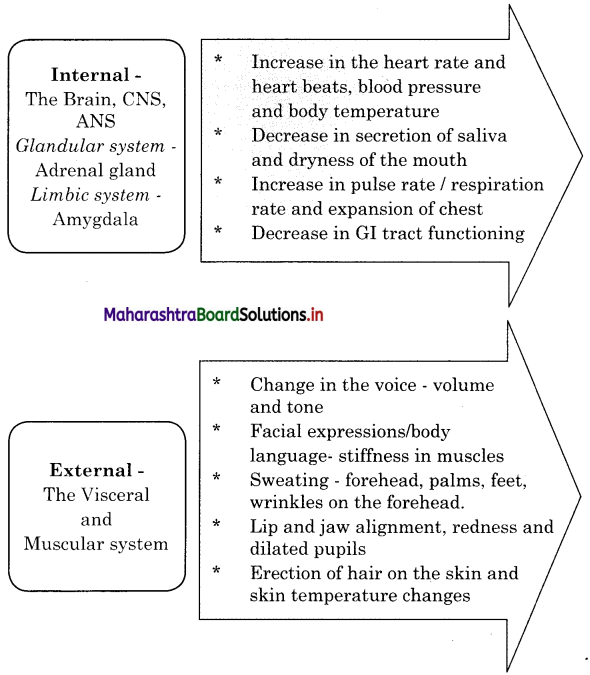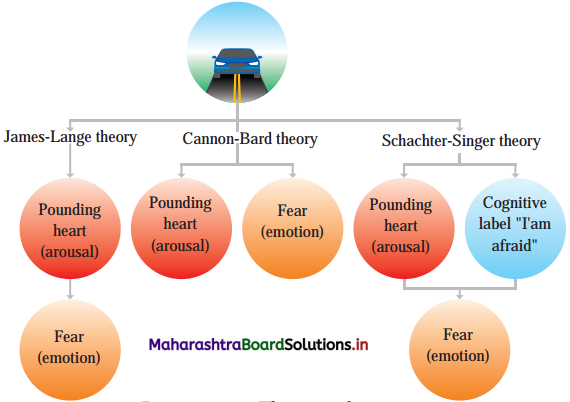Balbharti Maharashtra State Board Class 12 Psychology Important Questions Chapter 5 Emotions Important Questions and Answers.
Maharashtra State Board 12th Psychology Important Questions Chapter 5 Emotions
Choose the correct option and complete the following statements.
Question 1.
According to the theory, we experience physiological arousal and feelings simultaneously and independently.
(a) James-Lange
(b) Cannon-Bard
(c) Schachter-Singer
Answer:
(b) Cannon-Bard
Question 2.
According to Ekman, there are basic emotions.
(a) 2
(b) 5
(c) 6
Answer:
(c) 6
![]()
Question 3.
is an emotion that is in response to some threat.
(a) Sadness
(b) Fear
(c) Disgust
Answer:
(b) Fear
Question 4.
Plutchik’s model explains that there are primary emotions.
(a) 8
(b) 6
(c) 12
Answer:
(b) 6
Question 5.
is not a primary/ basic emotion according to Plutchik.
(a) Trust
(b) Anticipation
(c) Jealousy
Answer:
(c) Jealousy
Question 6.
Emotions are controlled by the ……………….. in the brain.
(a) cerebral cortex
(b) limbic system
(c) RAS
Answer:
(b) limbic system
Question 7.
Aniket shows creativity and has meaningful relationships. He has …………. emotional well-being.
(a) high
(b) low
(c) moderate
Answer:
(a) high
![]()
State whether the following statements are true or false.
Question 1.
“I feel sad because I cry”, This is the premise of the Schachter – Singer theory.
Answer:
False
Question 2.
Pride and guilt are considered as higher cognitive emotions.
Answer:
True
Question 3.
The fight or flight reaction is a reaction to sadness.
Answer:
False
Question 4.
Low serotonin levels are associated with clinical depression.
Answer:
True
Answer the following in one sentence each.
Question 1.
What is the premise of the facial feedback hypothesis?
Answer:
According to the facial feedback hypothesis, our facial expressions provide feedback to our brain about our emotions.
![]()
Question 2.
What are complex emotions?
Answer:
Complex emotions are emotions which result form the combination of basic emotions for e.g., surprise and sadness lead to disappointment.
Question 3.
According to Ekman, which are the basic emotions?
Answer:
According to Ekman, there are six basic (universal) types of emotions, i.e., happiness, sadness, anger, fear, surprise, disgust.
Question 4.
When does a person experience disgust?
Answer:
A person usually experiences disgust as a response to some unwanted stimulus.
Question 5.
According to Plutchik, how do emotions result?
Answer:
According to Plutchik, emotions result due to evolving over a period of time for increasing our chances of survival.
Question 6.
Why is Plutchik’s model important?
Answer:
Plutchik’s model is important from the perspective of emotional literacy, i.e., understanding emotional levels, complexity and change as well as appropriate emotional labelling.
Question 7.
What does emotional well-being mean?
Answer:
Emotional well-being means managing both positive and negative emotions, so that we can lead a healthy and productive life.
![]()
Question 8.
What does anger management mean?
Answer:
Anger management is an intervention programme to prevent anger from turning into a habit or obstacle by creating awareness of and responsibility for our emotions.
Explain the concepts in 25 – 30 words each.
Question 1.
Emotions
Answer:
The word emotion is derived from the latin word ‘emovere’, which means to stir up or to move. An emotion refers to an involuntary, aroused state of an organism involving physical, cognitive and behavioural components. It is described as a combination of bodily arousal, e.g., increased heartrate, thoughts and feelings, i.e. emotional tone and expressive behaviour i.e. facial expression.
Question 2.
Emotional well-being.
Answer:
Emotional well-being means managing our emotions, both positive and negative ones, so that we can lead a healthy and productive life. Persons who have high emotional well-being experience benefits such as-
- better able to deal with stress
- better self-regulation
- increased productivity in tasks undertaken
- increased creativity and openness to new experiences
- life satisfaction due to meaningful activities and relationship.
Question 3.
Emotional Abuse.
Answer:
Emotional abuse is any kind of abuse that is emotional rather than physical in nature. It occurs when one person subjects or exposes another person to intentionally harmful behaviour that may result in anxiety, depression and psychological trauma in the victim.
The types of emotional abuse may be-
- verbal abuse such as blaming, insulting, labeling, threatening, swearing, etc.
- nonverbal abuse such as ignoring, rejection, bullying, spying, etc.
![]()
Question 4.
Anger Management.
Answer:
Anger management is an intervention programme to prevent anger from turning into a habit or obstacle. It enables the person to create awareness of and responsibility for his/her emotions. Anger management involves two aspects (i) managing one’s own anger (ii) learning to respond effectively to anger in others. The three R’s in anger management are Relax, Reassess and Respond.
Answer the following questions in 35 – 40 words each.
Question 1.
What are the techniques to deal with emotional abuse?
Answer:
Emotional abuse is any kind of abuse that is emotional rather than physical in nature. It occurs when one person subjects or exposes another person to intentionally harmful behaviour that may result in anxiety, depression and psychological trauma for the victim.
The techniques to deal with emotional abuse-
- Accept that emotional abuse is not because of you, i.e., don’t justify the actions of the abuser.
- Respond assertively to the abuser but seek distance from him/her.
- Give yourself time to heal.
- Prioritize your self-care, eating right, exercise, etc.
- Mobilise support from family and friends. If needed, seek professional help.
Question 2.
What are the benefits of emotional well-being?
Answer:
Emotional well-being means managing our emotions, both positive and negative ones, so that we can lead a healthy and productive life. Persons who have high emotional well-being experience benefits such as-
- better able to deal with stress
- better self-regulation
- increased productivity in tasks undertaken
- increased creativity and openness to new experiences
- life satisfaction due to meaningful activities and relationship.
Write short notes on the following in 50 – 60 words each.
Question 1
Characteristics of emotions
Answer:
The word emotion is derived from the latin word ‘emovere’, which means to stir up or to move. An emotion refers to an involuntary, aroused state of an organism involving physical, cognitive and behavioural components. It is described as a combination of bodily arousal, e.g., increased heartrate, thoughts and feelings, i.e. emotional tone and expressive behaviour i.e. facial expression.
Some characteristics of emotions are-
- Emotions may be positive, e.g., joy or negative, e.g., anger.
- Emotions may occur for a brief period or may be long lasting.
- Emotions may be important for our survival, e.g., fear or for our psychological well-being, e.g., love.
- Emotions differ in intensity in expression for e.g., annoyance-anger-rage.
- Complex emotions (higher cognitive level emotions) result from the combination of basic emotions, for e.g., surprise and sadness lead to disappointment.
- According to Ekman, there are six basic (universal) types of emotions, i.e., happiness, sadness, anger, fear, surprise, disgust.
![]()
Question 2.
Physiological changes during emotions.
Answer:
Physiological changes refer to automatic reactions that take place in our body in response to some stimulus, for e.g., if you saw a snake, the brain at the cognitive level perceived the stimulus as dangerous. This leads to physiological arousal such as dilated pupils, increased heart rate, increased pulse rate, sweating. At the emotional level you experience fear. The Autonomic Nervous System and Glandular system signal the pituitary gland which activates the adrenal glands to secrete the cortisol hormone. This triggers “the fight or flight” response. At the behavioural level there is an action plan such as running away or calling for help, etc.

Answer the following questions 80 – 100 words each.
Question 1.
Theories of emotions.
Points:
(i) James-Lange theory
(ii) Cannon-Bard theory
(iii) Schachter-Singer theory
Answer:
The word emotion is derived from the latin word ‘emovere’, which means to stir up or to move. An emotion refers to an involuntary, aroused state of an organism involving physical, cognitive and behavioural components. It is described as a combination of bodily arousal, e.g., increased heartrate, thoughts and feelings, i.e. emotional tone and expressive behaviour, i.e., facial expression.
The main theories of emotions are-
(i) James-Lange theory – It was one of the earliest theories to explain emotion. According to William James and Carl Lange, physiological arousal instigates the experience of emotion. It proposes that each specific emotion is attached to a different pattern of physiological arousal. For e.g., we feel sad because we cry. The sequence of events in emotional experience is Emotion Stimulus – Physiological Response Pattern → Affective Experience.
(ii) Cannon-Bard theory – According to Walter Cannon and Philip Bard, we may experience the same physiological arousal but emotions can be different, for e.g., we don’t cry only when we are sad but we also cry when we are angry or extremely happy. We experience physiological arousal and feelings at the same time and independently. For e.g., seeing a man with a gun prompts the feeling of fear as well as a racing heartbeat.
(iii) Schachter and Singer’s Two Factor theory – According to Stanley Schachter and Jerome Singer, emotion is based on two factors, i.e., physiological arousal and cognitive label, for e.g., an environmental stimuli (growling dog) elicits a physiological response (increased heart rate). We cognitively label this response (fear).

![]()
Question 2.
Emotional well-being.
Points:
(i) Meaning
(ii) Aspects
(iii) Benefits
Answer:
The word emotion is derived from the latin word ‘emovere’, which means to stir up or to move. An emotion refers to an involuntary, aroused state of an organism involving physical, cognitive and behavioural components. It is described as a combination of bodily arousal, e.g., increased heart rate, thoughts and feelings, i.e. emotional tone and expressive behaviour i.e. facial expression.
(i) Meaning – Emotional well-being means managing our emotions, both positive and negative ones, so that we can lead a healthy and productive life. Emotional well-being is not easily observable. It can be guaged on the basis of how a person rationally handles a situation involving some stressors or leading to negative emotions. Emotional well-being refers to understanding and managing one’s emotions without getting overwhelmed by negative emotions but instead encouraging positive emotions.
(ii) Aspects – The aspects of emotional well-being are at three levels viz. physical, emotional and social.
- Physical level, i.e., well balanced diet, exercise.
- Emotional level, i.e., practise mindfulness, raising levels of motivation and optimism.
- Social level, i.e., engaging in prosocial behaviour, meaningful relationships.
(iii) Benefits – Persons who have high emotional well-being experience benefits such as-
- Coping with stress – It helps to deal with stress using healthy methods such as exercise, social support, etc.
- Better self-regulation – It enables the person to label how they feel and accept negative emotions life fear, anger, etc.
- Increases productivity in tasks undertaken – The ability to focus is enhanced, the person feels positive and energized.
- Increases creativity – The person indulges in divergent thinking, shows curiosity is open to new experiences.
- Life satisfaction – The individual is able to have meaningful interactions and relationships, show empathy, altruism and engage in activities like volunteer work.